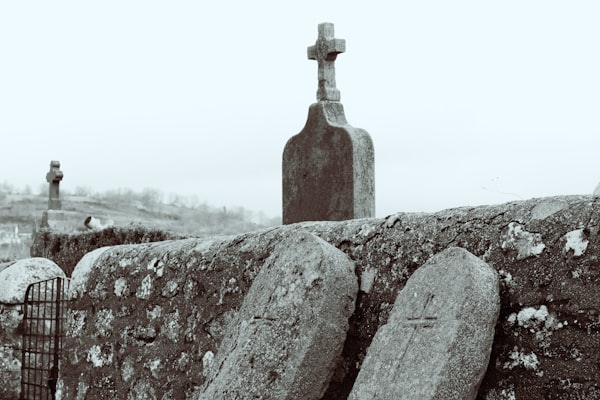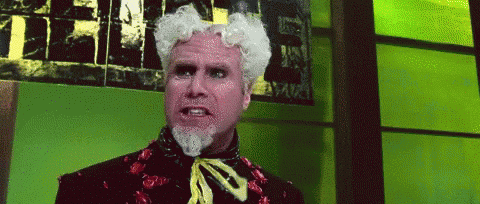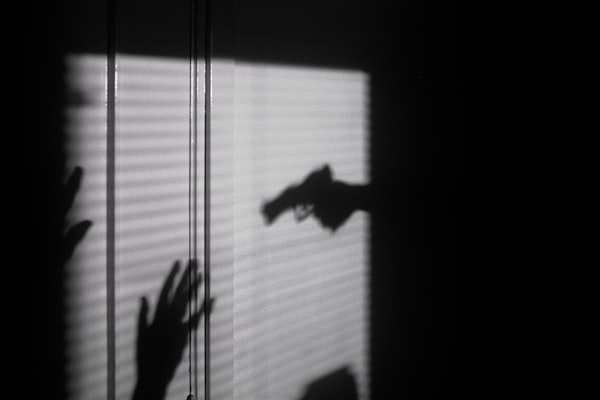The Fifth Columnists
Much of the undermining of New Zealand's public health response has come from the media - and it needs to stop.
This is a long one, so…
Let’s begin with a series of interesting facts.
Some extracts from the first-ever editorial of the New Zealand Herald, November 13, 1863, which is very concerned with the health of the business community. (Content warning: racism, ethnic cleansing, purple prose.)


The New Zealand Herald Twitter account, October 3 (Mean Girls Day) 2021.
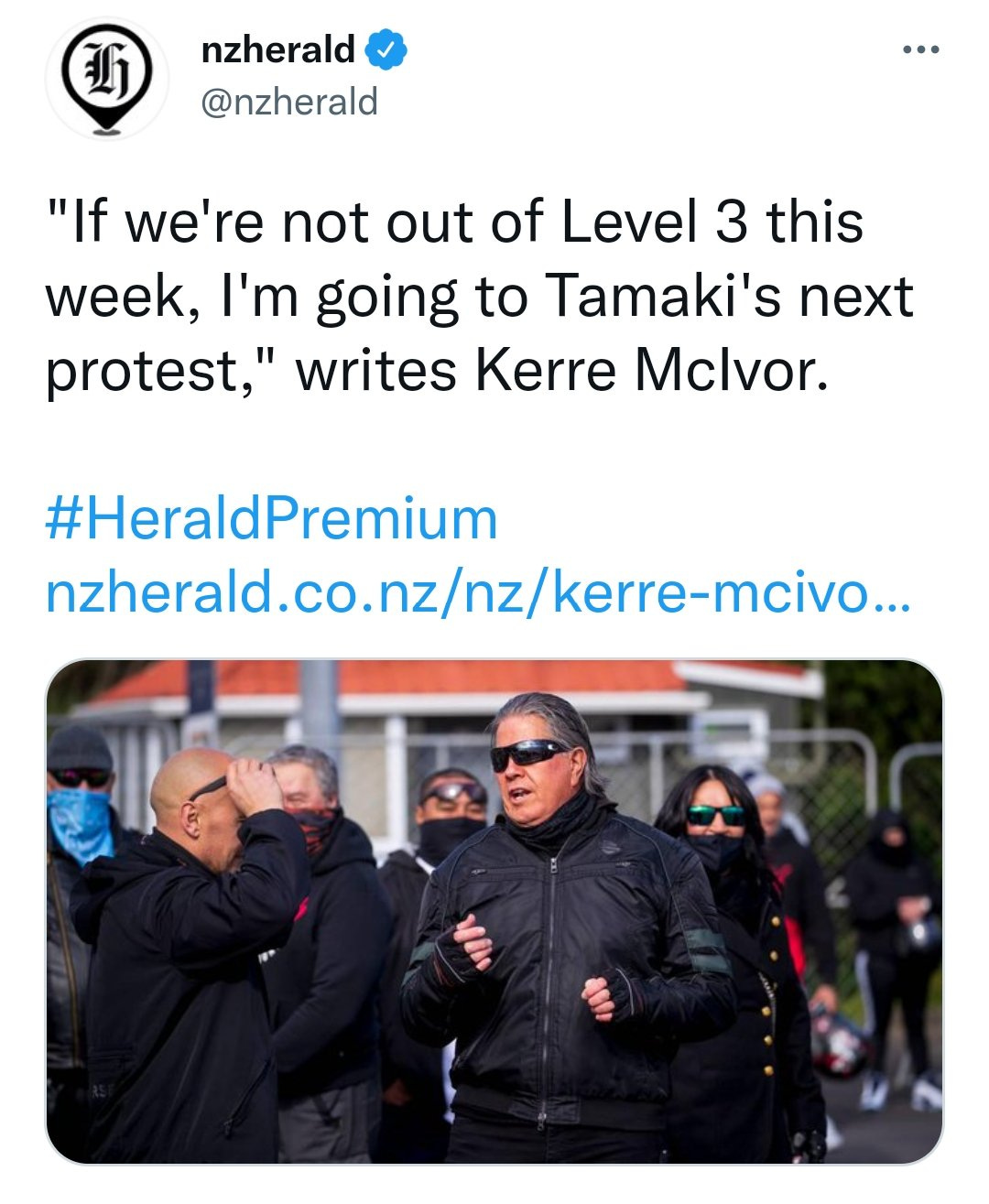
An extract from the “Trust in news in New Zealand 2021” paper published by AUT, April 29, 2021.

Interesting.
So here we are: 2021, year two of a global pandemic that has killed, at minimum, 4.5 million people — the rough equivalent of New Zealand’s population being all but wiped out. To date, New Zealand has had one of the most comprehensive, successful and popular public health responses in the world, and some truly good luck. But the ultra-contagious Delta variant has now snuck past our defences, and our largest city and several regions are in Level 3 lockdown.
And sizeable chunks of the New Zealand news media, as they have done since the start of the Covid-19 pandemic, are undermining the public health response. Multiple news publishers in NZ have intentionally and consistently platformed the worst takes and advocated for the worst possible courses of action that, if followed, would have left thousands, or tens of thousands, dead.
This undermining, in the guise of opinion journalism, has been led by NZME’s stable, including the New Zealand Herald and Newstalk ZB, which are these days essentially the same publication. A lot of NZME’s undermining comes, incredibly, from two actual married couples, who between them comprise what is possibly the country’s largest opinion media platform. Mike Hosking, Kate Hawkesby, Barry Soper, and Heather du Plessis-Allan.
But wait, there’s more. There’s the Herald’s John Roughan. There’s Stuff’s Mike Yardley. There’s Newshub’s Ryan Bridge, who is for some reason gifted another platform on top of his regular radio and TV shows at the usually-excellent Newsroom.1 There are many more — too many to list, really. It’s a roll-call of some of New Zealand’s most high-profile people, all of whom have access to vast media platforms to spread their opinions, unhindered by any kind of health expertise, and unchecked by any sense of responsibility given the gravity of the present moment.
It’s important to note that relatively little of this attack on an unprecedented public health response has taken place in the medium of news reporting. While it’s often sensationalized, news journalism has mostly been consistent with the ethical requirement to report the truth without fear or favour. News journalists aren’t the ones at fault here. Most have difficult, poorly-paid, and often thankless jobs, which have been made much harder by newsroom downsizing and lack of resourcing, combined with high workloads and the taxing requirements of reporting on a global pandemic.
Instead, the undermining has taken place under the banner of the media’s opinion columnists and broadcast hosts; the mouthpieces for what publishers and their advertisers actually think. Their attack has been endless. Because the word “pundit” implies expertise, which these people typically don’t have, I’m going to lump them all together in a category I’ll call “opinionists.” It’ll save me typing “opinion columnists and broadcast hosts and ex-politicians” over and over again.
I’m not lacking for examples of this extraordinary attack on public health. Because I am apparently a masochist, I asked NZ Twitter to crowdsource some of the worst takes they’ve seen. Even by the high (by which I mean low) standards set by the media over the course of the pandemic, there are some astonishing howlers in there.
Let’s have a look at some of what’s been said, shall we?
“The public health response preventing mass death is morally wrong”
Sometimes they really do just come right out and say it. Here’s Ryan Bridge, August 15, 2020.

This is such a neat summary of the problem with these opinions that I could almost stop here. Here’s the issue: if something - in this case, lockdown - isn’t “the right thing, morally, to do,” then it’s obviously justifiable for members of the public not to engage in it. Without very high rates of vaccination, preventing mass death from Covid-19 and its variants requires an understanding shared by millions of citizens that allowing themselves to be locked down to to avoid spreading a deadly virus is morally the right thing to do. Bridge is here explicitly undermining that principle. Why?
It’s for the same reason nearly every other opinion-monger has cited in their endlessly repeated concern-trolling: “Won’t somebody please think of the corporations?”

Let’s be clear: having a business die is difficult and heart-breaking. You know what’s worse? Actually dying. What’s also worse? Having loved ones die. And worse again? Having thousands of people, all of whom are loved ones to someone, die.
A business that dies can be reborn. A person that dies cannot. It's as simple as that. This fact — and the fact that nations choosing “we must learn to live with the virus” prior to the advent of the Covid vaccines almost immediately began to suffer catastrophic mass death — has been consistently ignored by the media’s hot-take machine.
Elimination is impossible and doesn’t work, if you ignore the 18 months where it was possible and worked
For a great example of this trope, let’s hear from Heather du Plessis-Allan’s husband and media veteran of most of the last century, Barry Soper, on 21 September 2021.

That’d be the same “impossible elimination strategy” that saw better outcomes for NZ than nearly every other OECD nation for 18 solid months, Barry, but go off. Except for those 18 months, it was impossible. To make the point, let’s use a tool that, somehow, opinionists who decry the success of NZ’s approach seem never to have seen: The Covid-19 Stringency Index.

As we can see from the index, from near the start of the pandemic up until the beginning of the Delta lockdown on August 15, New Zealanders enjoyed an extraordinary measure of freedom compared to other comparable nations, including essentially all of the OECD.
Of course, that’s currently a thing of the past; we’re back in lockdown. But, according to the opinionists, that’s because of “the spin.”
Barry continues:

This isn’t “the spin,” Barry. We know, from both modelling and actual live examples in other countries, exactly how fast the Delta strain of Covid-19 spreads in populations that aren’t taking precautions. But you have a keyboard that apparently knows better than both expertise and evidence, so by all means carry on.
A bizarre inability to recognize the scale of the catastrophe in other countries compared to NZ
The falsehoods most promulgated by the opinionists are lies of omission. Ignoring the extraordinary scale of the Covid-19 tragedy in nations like the US and the UK is the norm. Instead, we’re told to be jealous, because other countries are “opening up.” A country is cherry-picked as an example — in the early days of the pandemic it was Sweden, and then when it became clear that Sweden’s approach was catastrophic, the opinionists happily moved the goalpoasts to another nation. The current favourite is Singapore, which is currently (and inconveniently, for the pundits) oscillating between loosening and tightening restrictions, so we can anticipate a new favourite will be chosen soon.
Here’s HDPA, on 22 August 2021.

It’d be difficult to find anyone who’s ever seriously suggested that we should keep our borders closed forever, but that hasn’t stopped the people who get paid to make this shit up. It’s an old tune, done to death. Here’s HDPA, back on 23 April, 2020, by which time the scale of the catastrophe unfolding in other countries was well known:

“Just a wee bit!” To showcase how little this messaging has changed since the early days of the pandemic, here’s Kate Hawkesby on 23 August, 2021.

Of course, the “rest of the world” isn’t “open;” as anyone can see from the Stringency Index, most comparable countries are still labouring under significant restrictions, which can and do ratchet up higher when Covid cases threaten to overwhelm the health system. But, undeterred by reality, they carry on. Here’s Paul Henry, with opinions on his Palm Springs, California bubble:

That’s nice, Paul. The only fly in that ointment is the 5,055 deaths in Riverside County from approximately 367,000 Covid-19 cases, a death rate of around 1.3 percent. Those people will be unable to get on with their lives, by virtue of being dead. What’s more, Riverside County (which has a lower full vaccination rate than NZ, at just 49 percent to NZ’s 55 percent) is at the time of writing still grappling with a fresh wave of Covid restrictions and deaths (130 have died over the last two weeks), and the CDC currently recommends that even vaccinated persons wear masks when out of their homes. That’s not “moving on,” that’s the reality of life in a pandemic that is still raging.
“Cutting through the spin” by, uh, lying
“We have lost our marbles when it comes to health matters in this country. We are more gripped by whether people end up in hospital with Covid… when there are people dying of cancer that couldn’t be treated and haven’t been… The Cancer Control Agency was yesterday talking about how half of new cancer cases are going to be missed.”
That’s Mike Hosking with the alarming news that cancer diagnoses and treatments would be missed because of Covid lockdowns, a claim that was echoed by the Leader of the Opposition, Judith Collins. The only problem with this is that it’s not true. Cancer diagnosis and treatments do not appear to be declining at all. In fact, they’re keeping pace with historical rates - or at least they are in NZ. You know what is interfering with cancer treatment in other countries? Hospitals being overwhelmed by Covid-19 patients.
Moving on, here’s Heather du Plessis-Allan with the claim that the Government is trying to “gaslight” the public:

“Trying to gaslight us into believing we’re still going to reach zero” isn’t true. For clarity, here’s what Bloomfield actually said about elimination, over a year ago, on April 20, 2020.
“The elimination approach focuses on a zero tolerance towards new cases, rather than a goal of no new cases.”
And here’s what he said in September, 2021.
“I don't think a level 1 scenario with Delta necessarily means a series of zero cases, because what we have got now, of course, is vaccination. We may not get back to zero but the important thing is we are going to keep finding any infections and basically continue to contact trace, test, isolate people.”
Be as confused as you want to be, opinionists. The epidemiological understanding of “elimination” differs from that of the public, and it’s easy to see why that might confuse. But please don’t make up falsehoods in order to justify your own confusion, and then pass both falsehood and confusion on to your audience.
Help, help, we’re being oppressed!
Thanks to the pandemic, the opinionists have acquired the ability to read the minds of millions of people at once, apparently by looking in the mirror. We — the audience — are told over and over, via the opinion pages, that we are “angry,” and that we “live in fear.” Absent any real evidence, we hear: “Aucklanders are angry,” “South Islanders are angry,” “New Zealanders are angry.” Opinionists feel oppressed so, ipso facto, they must be.
The fact that they have spent nearly two years enjoying extraordinary freedom of movement relative to other countries’ experience of the pandemic seems completely lost on them. Apparently, we’re all either in jail or a totalitarian country. Far from being one of the world’s most free and least corrupt liberal democracies, according to op-eds published simultaneously across every major newspaper in the country, we’re actually just like North Korea.
Here’s John Roughan for the NZ Herald, with a typical example:

That’s not it, Roughan, you eternal champion of missing the goddamn point. People don’t want to “stay safe in the hermit kingdom;” they simply don’t want their loved ones to sicken or die of a horrible disease. They want to look after others. It’s that “love thy neighbour” that Jesus bloke always banged on about. That’s it.
Here is Barry Soper again, with another example, 25 August 2021.

Why does this count as undermining the health response? Because if, as the opinionists insist, we are imprisoned, or are being “held hostage” by the unjust jailers of a totalitarian state, then it is morally justified — or even morally imperative — to resist those jailers. If the escalating violence of lockdown and anti-vax protests we see in other countries are anything to go by, there is no shortage of people who take that message extremely seriously. To keep promoting it is beyond irresponsible.
“I am tired of being personally inconvenienced by the global pandemic that’s killed millions of people, a fact I just kind of ignore”
Pretty much everyone finds the privations of a pandemic difficult, but we find ways to get by. Opinionists take it personally. Here’s Newstalk ZB broadcaster and Stuff columnist Mike Yardley, in The Press, August 31.

Oh, no, Mike. Not your birthday. And “a casualty?” What an astonishing turn of phrase. Let’s see you explain that choice of words to the millions of actual casualties of this virus, who have also had their birthdays cancelled by virtue of being fucking dead.

In the first paragraph Yardley rages against a proposition that — as we’ve already seen — essentially no-one but he and his fellow op-ed merchants are putting forward: that we stay locked down forever. That’s never been anyone’s plan, much less the Government’s, but the opinion-mongers will trot this strawman out and beat the crap out of it at the first opportunity because, well, it’s the only way their arguments work.
And in the second para: Why do we give the merest shit what the British press thinks of us? The UK, spurred on by gleeful “open up!” op-eds from the Murdoch tabloid press, has recorded 2,037 pandemic deaths per million people. New Zealand has, at the time of writing, had 5.4 Covid deaths per million. By this and other measures, such as economic performance, we have done far better as a nation than the United Kingdom. But that doesn’t matter, because “perception.” Big Brother Britain is watching us, and the colonial cringe is back, at least for Mike Yardley.
Now’s probably a good time to see what the Herald meant by this tweet, which if the online reaction was anything to go by, led to droves of people cancelling their NZ Herald subscriptions:

Pretty shocking, right? A much-hated public figure has flouted the law and the opinion journalist is going to join him next time? Let’s see what she actually said:

Oh. It’s a joke.
But that’s the problem with mass media’s conflict addiction in a nutshell: pack up a goofy joke in the most controversial package possible, and then just tweet it out to your 334,500 followers, and never mind the damage that might do.
“When are you going to wave the white flag and just let us get on with it?”
The problem with Mike Hosking on Covid-19, or anything else, is that he so rarely says anything of substance. What he means is easy enough to parse; he’s been exhorting us to “live with” Covid since, well, pretty much the start. He’s repeatedly called elimination “delusional,” and charged the government with stoking fear and deploying “mind control.” He’s repeatedly attacked people who comply with lockdowns as being like “sheep” or, confusingly “well-trained dogs.” He’s a weathervane. When cases are low, we’ve overreacted; when cases are high, we should have done more. This graphic sums it up better than exhaustive analysis ever could:
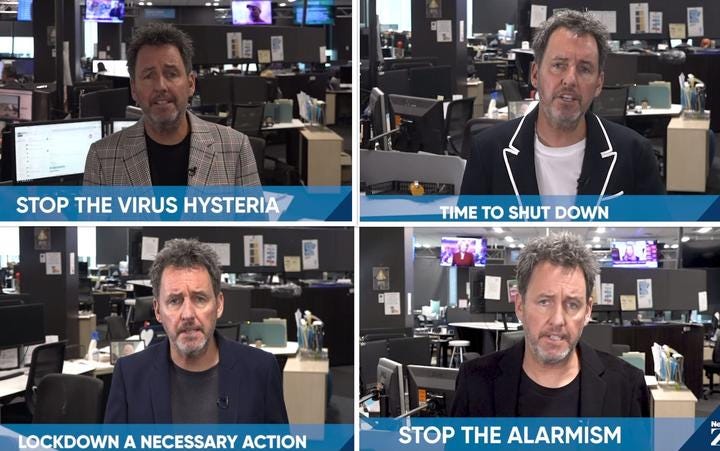
But as hard as it is to pin down anything definitive, here are a couple of pieces I consider most emblematic of Hosking’s attacks on the public health response.
Here’s Hosking back on 4 August, 2020.

You’ll notice that I linked to a BSA decision, and here’s why: a listener took issue with the bald-faced lie that “we are not in a pandemic” as well as the rest of the potentially dangerous disinformation, to which the BSA said:


Here’s the paraphrase: if you’re just kind of being woolly about things, you can mislead and prevaricate to your heart’s content. This is why opinionist content is so consistently fact-free: if Hosking avoids actual facts, which are supposed to be the bedrock of journalism, he can say pretty much whatever he wants, while leaving the listener or reader in no doubt as to what he actually thinks — and the BSA is mostly cool with it.
But the most telling Hosking quote of all, I think, is this one. Instead of one of his monologues, it’s from an interview with Covid-19 Response Minister Chris Hipkins.

That’s about as definitive as you get from Hosking: he wants us to “wave the white flag” on Covid so we (he) can “get on with it.” The people who will assuredly die if we undergo the wholesale surrender Hosking recommends don’t rate a mention.
You win, we lose
One of the biggest problems with this avalanche of public-health-undermining opinion from the privileged few paid to produce it isn’t just that it’s ill-formed, or relentlessly negative, or full of misinformation, false statements, or outright lies. It’s that it might just work.
After weeks of Level 4 lockdown in Auckland, with a few stubborn new cases found each day, the Government made an “in principle” decision to take Auckland to Level 3. This move was accompanied by a chorus of dismay from public health experts. Many called it a “gamble,” which is Science for “what the fuck?!” Cases promptly, and predictably, climbed. The Government’s much-lauded clear communication faltered. The easily-understood system of lockdown levels one through four is apparently a thing of the past. In Auckland there is confusion about what the rules are, or what they mean, and what the implications are for shared toilet use.
What’s more, despite the constant refrain from opinionists along the lines of “Aucklanders are angry,” the public health policy that prioritised protecting people through lockdowns has been popular, to the point that its political architects were returned to office with an outright majority, something that MMP was supposed to prevent. And public health prioritisation remains popular, despite the news media’s effort to conflict-spin its own poll that found overwhelming support for lockdown as “AUCKLANDERS DIVIDED OVER LOCKDOWN.”
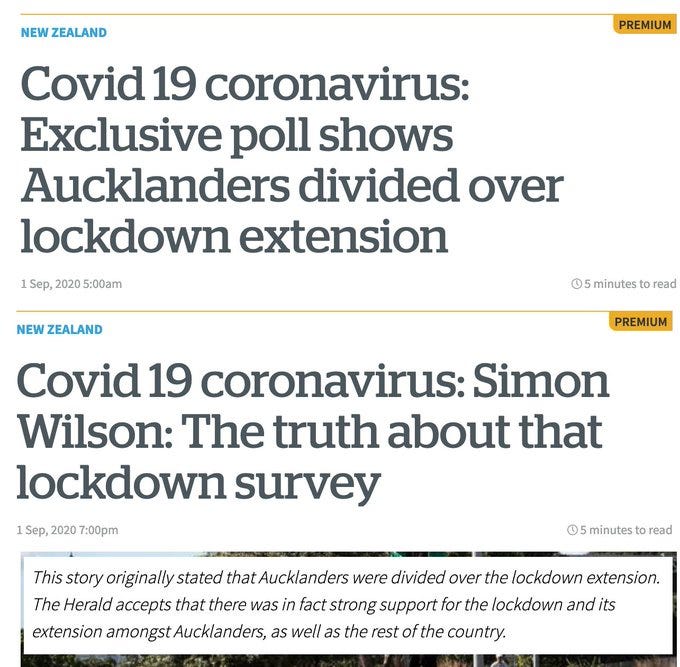
So why waver? In a piece titled “Government must release Bloomfield’s elimination advice” Marc Daalder (one of NZ’s most consistently excellent journalists on the Covid crisis) asks the same question, and it looks like the unswerving assault from commentators may have played a part.

There you go. It’s the vibe. Except, as Daalder points out, aggregate data on people movement in Auckland didn’t show the uptick you’d expect if Aucklanders were breaking lockdown en masse. People were still following the rules.
Now, what the Government does is on the Government’s head. But the publishers who claim to hold the Government to account have also spent the pandemic trashing a popular and effective public health policy, laundered through highly-platformed paid mouthpieces. They know that decision-makers listen to them - indeed, they boast about it on their profile pages.

If New Zealand starts to see the mass sickness and death other nations have suffered, the media’s “live with the virus” propagandists deserve their share of the blame.
No, it’s the audience who are wrong
There are plenty of opinions that the media themselves deem inappropriate to publish. There are, worryingly, plenty of people in the world that would happily pen 800-ish words in defence of fascism, or eugenics, or holocaust denial, or paedophilia. We don’t see many such opinions in the mainstream media, as such ideas are rightly reviled by society. Why, then, does cheerleading for pandemic policies that we’ve all seen create mass death receive such pride of place in the nation’s media platforms?
As we’ve seen, New Zealand’s trust in media is slipping. At journalism school, we learned that journalists are often about as trusted as used car salesmen. Could this be because of the dissonance created by publications that simultaneously inform and misinform their readers, or educate and infuriate, via the news and opinion sections, respectively?
Over the pandemic, the backlash against opionionists has been furious and sustained. Audiences have identified media opinion sections as being complicit in attacks on the public health response, and on their own efforts to comply with that response. Millions of people have sacrificed livelihoods and relationships for the greater good of not spreading a deadly virus, and to have the most high-profile people in the country rub salt into that wound on a daily basis is intolerable. Audiences have sought to be heard, and found there’s no-one to actually hold accountable.
Audience members who do venture to complain swiftly realise there’s an entire system built to stymie their concerns. To lay a complaint, you must first write to an editor or broadcaster. Then, if the complaint isn’t addressed, you get to go to either the BSA or Media Council — both of which carve out explicit exceptions for opinion, and this sees falsehoods and misinformation that would earn a furious dressing-down for news journalists blithely waved aside. Editors, when they can be contacted, seem fundamentally uninterested in engaging with the concerns of their customers. Lacking options, the brunt of audience frustrations seems to have fallen on individual journalists via public mediums like Twitter, which is not an ideal way of addressing a systemic problem.
Of course, media are not ignorant of these criticisms. They’re acutely aware of them. But, when they do respond, they fail to engage with the substantive part of the critique and have instead decided that it’s not that they’re out of touch: instead, the audience is wrong.
“Why can’t we hear someone out if they have an opinion different to our own?” they wail, over and over again, before bombarding their audience with recycled opinions from the exact same thirty or so extraordinarily homogenous people that have comprised the vast majority of media opinion for the last decade or several.2 Instead of engaging with criticism, they offer finger-wagging, pie-eyed lectures. ‘Don’t the audience realise,’ they ask their keyboards, ‘that it is Journalism, the plucky Fourth Estate, that Cuts Through The Spin and Holds Power To Account?’

The media have consistently resisted efforts from their audience to explain to them something they should already know: the incredibly well-known fact that media don’t just cut through spin — they create it. That they are an adjunct to power, as well as a check on it. We can see a bit of how the sausage gets made in this disturbing thread from the Mental Health Foundation:
Today we had a media outlet on the phone encouraging us to speak out and say lockdown needed to end, suggesting we say it should end because of the toll they felt it was taking on people’s mental health. We declined.
— Mental Health Fdn (@mentalhealthnz) 5:11 AM ∙ Oct 4, 2021
Other audience concerns — like the peculiarly callous way that some Press Gallery journalists behave during press conferences, including (most recently) baying for information about a man who’d just died from Covid, before his next of kin could all be informed — are either dismissed out of hand or sneered at.
Audiences, fed up with what they see as lies and/or mass-death-advocacy in the opinion pages, are told that they they’re smart and can “distinguish between fact and opinion.” This response both ignores the science that says that this task is in fact extremely difficult for audiences, and misses the point.
Words matter, media and its defenders argue, when they’re “holding the powerful to account” or “cutting through the spin,” via a hard news report. But when words are instead employed by a media personality with a vast audience under the label “OPINION” to repeatedly undermine a public health response, suddenly words don’t matter anymore and it’s all in good fun. “No one would take [insert highly platformed opinion-monger] seriously,” is something I’ve heard repeatedly from media defenders over the course of the pandemic, which is laughably, obviously untrue.
The fact that high-profile opinionists command enormous, entrenched audiences, that they are (often) highly paid, and the abundance of evidence showing how easily vulnerable people can be “redpilled” over everything from anti-vax to Flat Earth, should instantly put the lie to the absurd idea that no-one takes media personalities seriously. Put another way: If no-one cares what Mike Hosking says, then why is he paid enormous amounts of money and given an enormous platform to say it?
Then there are the political media, who really need a separate piece about how they’ve treated a global health emergency in the exact same way they’d deal with a ministerial sex scandal, but I’ll pop a lowlight in here, for good measure. Here’s Luke Malpass, Stuff’s political editor, with the kind of amazingly snide take that we’ve come to expect from political reporters:

No, Malpass, the approximately 70 percent of New Zealanders who supported New Zealand’s public health response don’t love lockdowns, they love their loved ones being alive. They recognised that at the time the pandemic started, there was no alternative to being locked down that didn’t end in mass death, and they recognise now that following media personality calls to “wave the white flag and let us get on with it” could easily see the virus cut a swathe through high-risk communities and those not yet vaccinated. They recognise that such calls are both cowardly and immoral, spitting in the eye of our shared values.
And they’re not all lefties.
@MorganGodfery very surprised to learn Matthew Hooton is a lockdown leftie
— Hayden Donnell (@HaydenDonnell) 9:07 PM ∙ Oct 8, 2021
The problem is not, and never has been, with responsible news journalism, or even with critical analysis and opinion. There are plenty of substantive, good-faith questions and criticisms being made of New Zealand’s health response by some media. Examples are not hard to find. Newsroom’s reporting has been consistently excellent, and they’ve punched well above their weight in asking and answering hard questions. The Spinoff has taken pains to give scientists and science communicators a platform and make tricky, fraught subjects like epidemiology understandable to a lay audience. When they criticise the Government response, as they frequently do, it is in good faith.
For those suspicious that by “good faith” I mean “left-wing,” no — I mean “criticism that recognizes the paramount importance of preserving life, restricting the spread of a deadly disease, and that calls out problems while threading the needle of not dunking on the collective measures that are currently required to keep people safe.” The Right are entirely capable of doing this, when they care to - here is the New Zealand Initiative, née The Business Roundtable, with criticism that is extremely robust yet based mostly on the requirement to preserve life and curb the spread of Covid.3 I’d argue strongly that no-one should resist this kind of criticism (least of all the Labour Government and its partisans), as identifying and patching the undeniable holes in our response can only make it better.
But, notably, little if any investigation into these matters is being done by the highly-platformed opinionists and their ilk. They simply shriek the questions, over and over again, while querying their keyboards for the answers. While this process is frequently decried by many in the media itself, the real culprits — the publishers who try to have it both ways, who want the acclaim granted to sober-minded criticism but also the clicks that come with platforming their pet curmudgeons — are seldom identified.
Manufacturing Covid consent
In Manufacturing Consent, Edward Herman and Noam Chomsky identify “the advertising license to do business” as what they call an “editorial distortion filter.” Simply put, media are ultimately beholden to their advertisers, to their specific political and economic desires — or what publishers interpret those desires to be.
This brings us back to the New Zealand Herald’s racist, genocidal founding editorial. Let’s have another look at the pretext cited to invade the Waikato and take Māori land by force:
The fruits of a life of industry are the sacrifices of their vengeance. Agriculture perishes. Commerce languishes. Enterprise stands still.
And now let’s compare that to Mike Hosking, 12 October 2021:
How many people need to lose their jobs and how many businesses need to fold before they offer a light?… Auckland stuck, the economy stuck, and as a result of Auckland, the rest of the country is stuck as well.
It’s not quite as flowery as the original editorial justification for ethnic cleansing and land theft, but the spirit is similar. Commerce is the greatest good; all that stands in its way must be swept aside. It’s remarkable consistency, really, to have kept propagating the same message for hundreds of years. What’s infuriating in the present moment is the refusal to acknowledge that letting the virus run free with inadequate health measures in place is also catastrophic for commerce. The evidence that all the business-boosters claim to care about is clear: “Zero Covid is a cost-effective economic investment with lasting positive effects.”

Had New Zealand followed opinionist advice at the start of the pandemic, we’d have likely suffered economic catastrophe, and thousands would now be dead. Today, they continue to advocate for actions that could still leave a trail of carnage across New Zealand’s most impoverished, marginalized, and vulnerable communities, including Māori, the aged, and the immunocompromised.
The fact that media still encourage paid staff and contractors to continue in this vein is unconscionable. Until our major media organisations realise this, and pivot their opinion operations to prioritise truth and the public good, they can continue to expect audience anger, subscriber exodus, and the ongoing erosion of public trust.

Thanks for reading. This piece was tough to put together: it’s taken a lot of evenings. If you find it valuable in any way, please consider subscribing (either paid or unpaid) or sharing.
I’d love to know what you thought about this piece, or hear your ideas on what you think might be done about some of the perverse incentives in media that lead to prioritizing conflict and crank opinions. (I’ve got a few of my own, but they’ll have to be another piece, as this one is already much too long!)
It’s probably more correct to say “was gifted.” Bridge wrote four columns in total for Newsroom during the election campaign and has not written for them since. ↩
New Zealand’s media commentariat are, as far as I can tell, nearly all white and reflect the viewpoint of a very specific class. As a white male myself, I’d like to suggest we could more diversity in both opinion and the people who offer it. ↩
I mean, there’s still some free market magical thinking in there. Here’s a challenge for the NZI: Try to write a paper that doesn’t include the word “vouchers.” ↩

